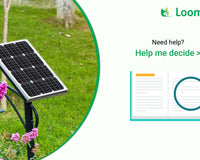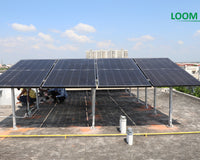Residential solar systems and commercial solar systems are both designed to generate electricity from the sun, but they have some key differences in terms of scale, purpose, and installation:
Scale
Residential Solar System: This type of solar system is designed to meet the energy needs of a single residential property, such as a house or an apartment. The power capacity of residential systems typically ranges from a one kilowatts to tens of kilowatts.
Commercial Solar System: Commercial solar systems are larger and more powerful, designed to cater to the energy demands of commercial and industrial properties. These systems can have power capacities ranging from tens of kilowatts to several megawatts.
Purpose
Residential Solar System: The main purpose of a residential solar system is to offset or reduce the homeowner's electricity consumption from the grid. It allows homeowners to generate their own renewable energy and potentially save on electricity bills.
Commercial Solar System: Commercial solar systems are installed on commercial and industrial buildings to generate clean energy for their operations. In addition to cost savings on electricity bills, commercial solar systems may also be used as part of a sustainability strategy or to meet corporate social responsibility goals.
Installation
Residential Solar System: The installation of residential solar systems is usually straightforward and can be mounted on rooftops or in the yard. The size of the installation is relatively smaller, making it easier and quicker to set up.
Commercial Solar System: The installation of commercial solar systems can be more complex and may involve customized engineering and design. These systems are often installed on larger rooftops, carports, or open fields, depending on the available space and energy requirements.
Financing and Incentives
Residential Solar System: Many incentives and rebates to encourage residential solar adoption. These incentives can include tax credits, subsidy, and net metering programs, making it financially attractive for homeowners to invest in solar.
Commercial Solar System: Commercial solar projects also have access to incentives and financial benefits, but the structure may differ from residential incentives. Additionally, for commercial systems, businesses may consider power purchase agreements (PPAs) or leasing options to finance their solar installations.
Grid Connection
Residential Solar System: Residential solar systems are typically connected to the local residential power grid. Any excess energy produced can be fed back into the grid for credit or compensation (net metering).
Commercial Solar System: Commercial solar systems can also be connected to the grid, and excess energy can be sold back to the grid. In some cases, larger commercial systems may opt for direct power purchase agreements with utility companies.
NOTE
Overall, both residential and commercial solar systems play a vital role in promoting renewable energy adoption and reduce electricity bills. The choice between the two depends on the energy needs, available space, and financial considerations of the property owner or business. Consulting with our professional solar installer or a Solar energy expert can help determine the most appropriate solution for an individual's needs and provide accurate cost estimates.












